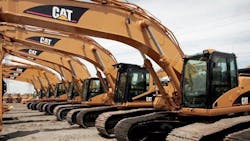IndustryWeek supply chain advisor Paul Ericksen shares his weekly review of the news.
China traditionally has sought to keep a balance between Boeing and Airbus, but Boeing’s order prospects have been complicated by the trade clash, says the March 25 article, Airbus Secures $35 Billion China Deal in New Blow to Boeing.
Rob Stallard at Vertical Research Partners, quoted in the article, saw China’s move “as part of broader trade discussion. For the Chinese to put tariffs on Boeing aircraft would be nuclear, but you can send messages in other ways. This tells the Americans that you have to play nice if you want us to reciprocate.”
In northwest Washington state where I live, we’ve known for some time that Boeing sees China as the next great market for commercial aircraft. The company has spent considerable effort and resources on developing a strong working relationship with the Chinese government. In light of this, the loss of this order to Airbus is not only a financial blow but also signifies that the partnership Boeing has sought to build is now on rocky ground.
China’s trade practices over the last three decades have created an uneven playing field for U.S. manufacturers, and we need to take action to correct those practices. Tariffs on China are justified until the balance of trade starts to even out. But tariffs should only be regarded as one tool on a negotiator’s tool belt, and other strategies must also be applied to get an optimum deal.
There is very little public visibility in U.S.-China trade negotiations, but from the blurbs that have come out, it is pretty clear that the U.S. feels it has most—if not all—of the leverage and, as a result, is taking a very positional negotiating stance.
Another way of saying this is that the U.S. wants it all, and wants it all now, and is willing to poke a stick in China’s eye to get it.
Read previous Supply Chain Initiative columns by Paul Ericksen
Americans tend to want to “win” on all issues in a convincing way, which can only happen if they, indeed, have 100% of the negotiating leverage. This strategy leaves the other side feeling like they’ve been coerced and wanting to return the “favor.”
China is sending a message that the U.S. doesn’t have all of the leverage and needs to allow for some middle ground.
Some may say that in any trade war, there will be instances of individual firms or industries having to take short-term hits for the overall good of the country. I can assure you that losing this deal is does not represent a short-term hit. The negative impact it will have on the Boeing-Chinese relationship will last for years.
The whole idea of the trade talks is to increase jobs in the U.S. Let’s take a rough look at what the loss of a $35 billion order means in job years. Say across all of the jobs involved in the production of a 737, the average pay is approximately $100,000 a year. Let’s also assume that only 10% percent of the $35 billion goes towards salaries. If so, the loss of this deal means the U.S. has lost just under 35,000 job years.
That is a hard hit that will not only be felt by Boeing, its suppliers and other businesses that rely on the spending power of Boeing and supplier employees. It will also significantly hurt the regional economies where these airplanes and their parts are produced.
The U.S. needs to have a longer view, prioritize what it wants, and take stiff positions on the things that matter most. If the strategy continues to be “win on all fronts and quickly,” U.S. companies and employees will be the ones with sticks in their eyes.
A Year on, Trump’s Metal Tariffs have More Losers than Winners reports that U.S. steelmakers Nucor and United States Steel saw significant profit gains in 2018, but manufacturers that buy the metal—led by Caterpillar—say the tariffs have hurt profits, caused layoffs and undercut U.S. suppliers so that OEMs are looking elsewhere for their components.
This is another example of U.S. trade policymakers’ tunnel vision. There are far more employees in the metal fabricating business (around 1.8 million, according to recent data from the U.S. Bureau of Labor Statistics) than there are in metal production (383,000, says BLS). I fear we are seeing just the beginning of the fallout from these tariffs.
Paul Ericksen is IndustryWeek’s supply chain advisor. He has 38 years of experience in industry, primarily in supply management at two large original equipment manufacturers.
About the Author

Paul Ericksen
Executive Level Consultant; IndustryWeek Supply Chain Advisor
Paul D. Ericksen has 40 years of experience in industry, primarily in supply management at two large original equipment manufacturers. At the second he was chief procurement officer. He then went on to head up a large multi-year supply chain flexibility initiative funded by the U.S. Department of Defense. He presently is an executive level consultant in both manufacturing and supply chain, counting Fortune 100 companies among his clientele. His articles on supply management issues have been published in Industrial Engineering, APICS, Purchasing Today, Target and other periodicals.
